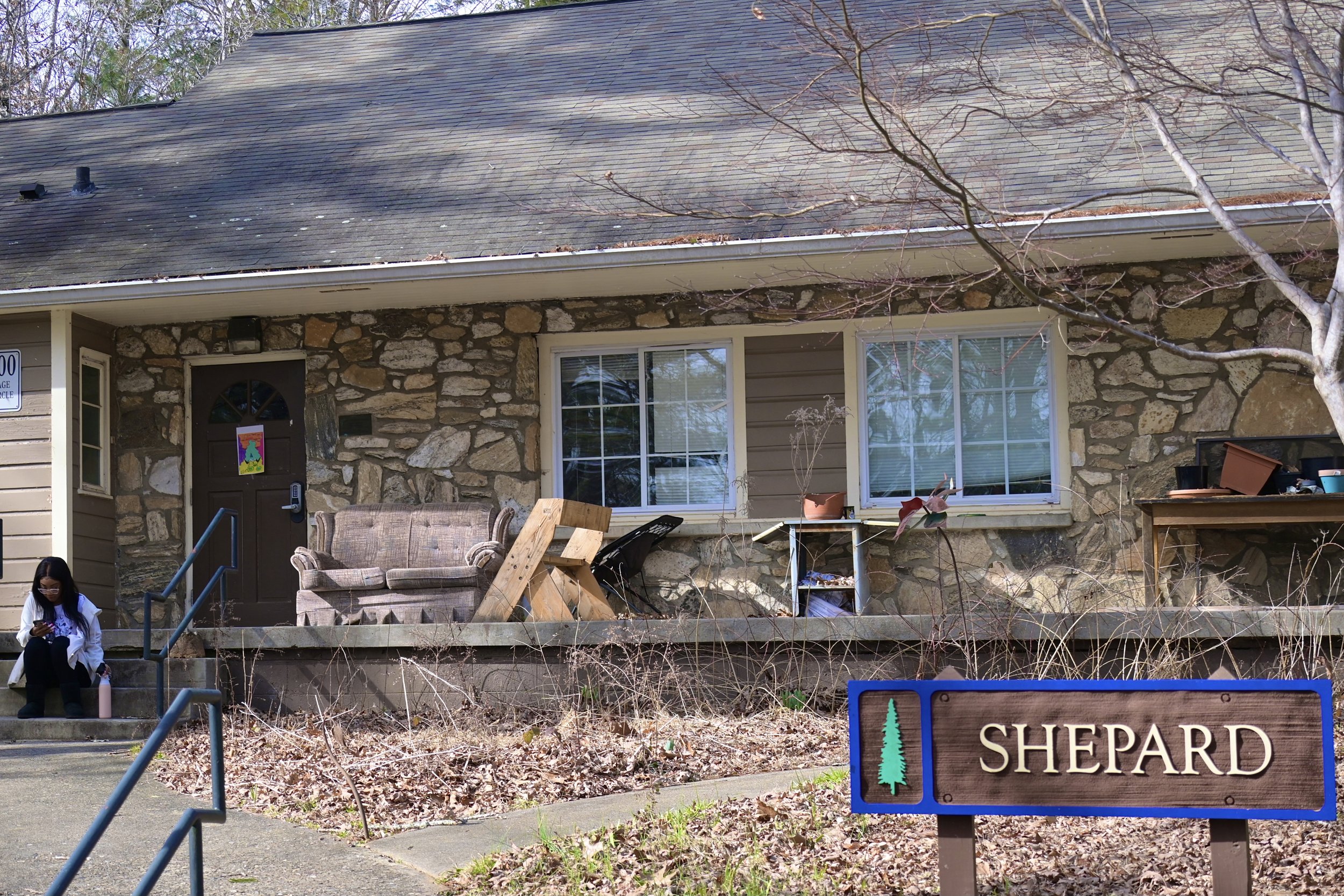The Future of Living and Learning Communities
Harley Woods | February 10, 2022
Ruby Jane Moser
Nijah Colston, a first-year at WWC, outside of Shepard.
Living and learning communities, often referred to as themed housing on Warren Wilson College (WWC) campus, are a consistent selling point to college applicants. Some themed residence halls have changed location and lost track of their identity over the past two years, specifically Shepard and Ecodorm.
Residents of Shepard, who make up a cooperative living community where students do not participate in the meal plan, raised concerns about the future of the house and its role in the larger Warren Wilson campus life. Those concerned include Harvest Browder, a junior working on the Garden Crew, who currently lives in Ecodorm and lived in Shepard last year.
“I’m seeing degradation of these communities because they’re not being taken care of or emphasized for their incredible ability to provide autonomy,” Browder said. “The actual building of Shepard is extremely old, and it is deteriorating and it cannot last much longer, especially since there have not been renovations and there are issues that students have been trying to address over the years that haven’t been fixed.”
Part of what makes Shepard and Ecodorm unique locations for residents is the layout of these buildings.
“The building and the dorms extend off of the community rooms which are the kitchen and communal living spaces,” Browder said. “The fact that it’s a house and the kitchen and the living room are the center of the house, that is what a community co-op house should be like. It gives that very home-like feel that is very important to some students like me.”
Resident Assistant (RA) of Shepard and environmental policy and justice major Jonatas Ferreira sheds light on how Shepard functions.
“We pool our money,” Ferreira said. “The more people we have, the more people there are to do chores and clean, and the more money we have to get communal food.”
Cooperative living, furthermore, involves developing a community with fellow residents. Ralph “RJ” Chittams, the director of Residence Life, added that this aspect of residential housing is not tied to the building itself.
“Shepard is not a co-op. Shepard is a building, co-op is co-op so that’s the bigger conversation,” Chittams said. “So as we look at co-op I would like to separate those two names. If the best place for co-op to be is Shepard then co-op will remain in Shepard.”
Since October of 2021, Chittams and Colton Goodman, area coordinator for the Ballfields area, have been building ideas and asking questions about what each living and learning community on campus does. Chittams explained that this process is his way of contributing to the question of whether WWC does what it advertises.
What Chittams and Goodman strive to do is pair certain living and learning communities with various faculty members and campus offices. In the case of the Wellness building, Chittams mentioned using Mariel Epstein Olson — director of counseling and wellness — with the Wellness Crew as a resource for residents living in housing and an opportunity to have wellness-themed programs for members of that community.
“As the administrator, as I look at it I go, ‘alright how can I advocate for funds?’” Chittams said. “Right now I have no data. By formalizing it a little I think it’ll help us years down the road.”
Both Chittams and Goodman are leading the process of reexamining what it means to be a part of specific living and learning communities. They plan to formalize housing agreements during the month of February to prepare for housing selection in April.
“What we’re trying to do and what the plan is for the next couple of weeks is to reach out to the community, to the people who currently live there and say, ‘when you chose to live here, what did you think you were doing?’” Chittams said. “We can line it up with professional standards, document those expectations, and line it up with a functional group or office on campus.”
Browder and Chittams agree that Ecodorm could be the solution to expanding the co-op program while being able to fix problems arising in Shepard’s foundation.
“(Chittams) was saying Eco was the ideal place for a co-op, and I get that, but it’s a little more dorm-like,” Browder said. “Given the amount of student interest in co-op living I think that it is also a great place. At the end of the day what matters is that you’re getting this opportunity.”
The relocation of co-op housing is largely a need-based one.
“(Residence life) want(s) to move the Shepard community to a different building,” said Ferreira. “They were thinking of a floor or wing in Eco because they want to renovate the house next semester. They cited a few structural issues with that.”
Both Browder and Chittams also state that they want to see the garden at Ecodorm revitalized.
“I think it’s extremely important to utilize the garden space for co-op communities who are living in the building,” Browder said. “It’s a beautiful space and I think that it’s plenty of space to provide the amount of food necessary for the people who live there.”
The ultimate goal that Residence Life maintains for living and learning communities is to establish clear expectations for students moving into specific areas. Chittams recognizes that responsibility falls on students to make Warren Wilson what it claims to be.
Students should contact Chittams with any questions regarding Residence Life at housing@warren-wilson.edu or rchittams@warren-wilson.edu.


